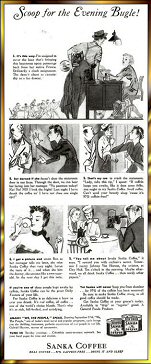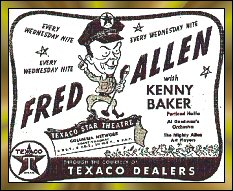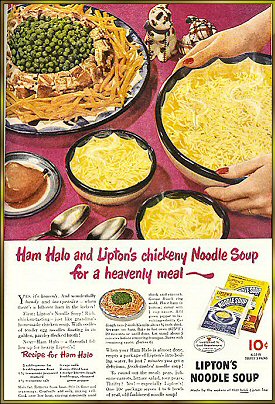HELP WANTED:
Odd Announcer’s Jobs
Part I
“Be sure to get the delicious coffee that never
interferes with sleep….. Sanka Coffee!”
--- Harry Von Zell
Lincoln, Me. (DG)—
Since I played my very first radio show on cassette tape in
1976, I have heard a lot of radio commercials. 99% of them were the type of
commercials where the announcer (or announcers--- plural) described the product;
what it did; and tried to influence the listeners to buy the product. However,
there is still that 1% where the commercial was a little out of the ordinary---
and the announcer’s qualifications had to precisely fit that out of the ordinary
commercial.
This is the first of a 2-part article about those radio
commercials that brought out the announcer’s talents to the maximum. They are
formatted here as a newspaper want ad. To give you an idea when these
commercials aired, the year the radio commercial aired is listed at the
beginning of the want ad header. If I know that actual date of the broadcast,
it will also be mentioned. Here goes:
1940:
WANTED: ANNOUNCER WITH SINGING VOICE WITH
OPERA BACKGROUND FOR COFFEE COMMERCIAL.
APPLY WE THE PEOPLE, COLUMBIA NETWORK:
 During radio’s golden age, Harry Von Zell was one of the
best announcers of the era. He was heard presenting a lot of commercials for
everything from Sal Hepatica to Pabst Blue Ribbon (2
products that provided proper bodily functions when used a lot).
Von Zell was also known for forgetting the Sal Hepatica name in a
commercial on Fred Allen’s famous “Eagle Show.” During radio’s golden age, Harry Von Zell was one of the
best announcers of the era. He was heard presenting a lot of commercials for
everything from Sal Hepatica to Pabst Blue Ribbon (2
products that provided proper bodily functions when used a lot).
Von Zell was also known for forgetting the Sal Hepatica name in a
commercial on Fred Allen’s famous “Eagle Show.”
As good as he was on the air, Von Zell was at his absolute
best when he sang some opera on a radio commercial for Sanka Coffee
 . .
On the Tuesday, February 6, 1940 broadcast of Columbia’s
WE THE PEOPLE, the Sanka commercial began with Mark
Warnow’s orchestra opening with some stirring music. After the opening music,
Von Zell sang a few bars from The Chancellor’s Nightmare by Gilbert and
Sullivan. To his credit, Von Zell sang it quickly and without a musical word
out of place.
When he finished the musical ditty, Von Zell presented the
main event of his presentation--- the Sanka commercial. It was
amazing how he converted his message from its snappy beginning to a very
relaxing conclusion. Of course, Sanka’s main objective was to
provide its users the satisfaction of drinking coffee, yet allow them to sleep
at night.
1940:
WANTED: RADIO ANNOUNCER WHO CAN
PRESENT A COMMERCIAL WITHOUT SCRIPT.
APPLY HERE’S MORGAN, WOR/MUTUAL:
The announcers applied, but none of them were accepted.
Henry Morgan, “The Bad Boy Of Radio,” had to do the live commercials
himself--- which was OK with him! Since he ad-libbed the program, Morgan could
also ad-lib the live commercials--- much to the chagrin of his sponsors.
Among the victims of Morgan’s biting wit were (among
others) Adler Elevator Shoes, Eno Effervescent Salt,
and Berkeley Razor Blades. The latter product will be mentioned
here. The enclosed Berkeley commercial is a curious one--- even
by Morgan’s standards.
The commercial actually began with a musical recording of
Laugh, Clown, Laugh. After the recording was finished, Morgan had a
laughing fit. When he regained his composure, Morgan said the singer in the
recording was another satisfied Berkeley Razor Blade user (much to
the singer’s surprise, I’m sure). Getting serious (at least by Morgan’s
standards), Morgan talked about a guy who had a quarter in his pocket. He went
into a store; bought a box of Berkeley Razor Blades; and left the
quarter with the storekeeper. A split second after the product’s name was
mentioned, Morgan made a very odd sound like he was being electrocuted---
followed by dead air.
Friends, did the sponsors conspire and got even with Morgan
for all the things he said about their products? Is this the end of the Bad Boy
Of Radio? Of course, Morgan returned to the air--- I was trying to sound like
an announcer of a radio soap opera! All right--- stamp Hormel and
put me with the other hams!
After a few seconds, the program returned to the air.
Morgan regained his composure and continued with the Berkeley
commercial like nothing had happened. What exactly happened during those few
seconds isn’t exactly known--- but it was blended into the commercial like it
was in the script--- if there was one!
1942:
WANTED: ANNOUNCER TO AUDITION
WHILE PROGRAM IS ON THE AIR.
APPLY TEXACO STAR THEATER, COLUMBIA NETWORK:
 Sunday, October 4, 1942 was the first broadcast of the
TEXACO STAR THEATER for the new radio season. By the way the
broadcast began, Fred Allen was still hiring people, because the program was
moved to a new night and time--- and its length was reduced from an hour to 30
minutes. One would think the hiring and auditioning of performers was done off
the air, but Allen usually did things his own special way--- and the on the air
audition was under way on the program. Sunday, October 4, 1942 was the first broadcast of the
TEXACO STAR THEATER for the new radio season. By the way the
broadcast began, Fred Allen was still hiring people, because the program was
moved to a new night and time--- and its length was reduced from an hour to 30
minutes. One would think the hiring and auditioning of performers was done off
the air, but Allen usually did things his own special way--- and the on the air
audition was under way on the program.
Applying for the announcer’s job was Arthur Godfrey,
“That Man Himself.” To get the announcer’s audition under way, Allen wanted
Godfrey to read the script with the commercial for Texaco’s Car Warden
Service, a wartime vehicle service performed at every Texaco
station . If you know Godfrey, reading a commercial from a script was like him
drinking tea that wasn’t Lipton! It wasn’t done! Using the
excuse he couldn’t read, Godfrey winged his own commercial for Texaco.
With the ad-lib commercial sounding better than the script, Allen gave Godfrey
the announcing job. . If you know Godfrey, reading a commercial from a script was like him
drinking tea that wasn’t Lipton! It wasn’t done! Using the
excuse he couldn’t read, Godfrey winged his own commercial for Texaco.
With the ad-lib commercial sounding better than the script, Allen gave Godfrey
the announcing job.
Now that he was on the job, Godfrey was on hand to present
the Texaco commercials. Later in the broadcast, Allen asked
Godfrey to get the lead out and present the second Texaco
commercial. With war speed at 35 m.p.h., Godfrey informed Allen he couldn’t go
any faster than the maximum war speed. When he was situated in front of the
Columbia microphone, Godfrey ad-libbed the commercial for Texaco
Marfak Lubrication.
After hearing this broadcast, it was interesting that
Godfrey was the only one to apply for the announcer’s job.
1944:
WANTED: ANNOUNCERS AND AUCTIONEERS
FOR 3-MINUTE CIGARETTE COMMERCIAL.
APPLY YOUR ALL TIME HIT PARADE, NBC:
 This lengthy commercial required the services of 2
narrators; 3 minor speaking roles; and 2 tobacco auctioneers. If my addition is
correct, it was 7 people for 1 commercial! With 7 different people used, this
commercial can be costly--- but since it was for Lucky Strike, a
major radio sponsor during the golden age--- no problem! This lengthy commercial required the services of 2
narrators; 3 minor speaking roles; and 2 tobacco auctioneers. If my addition is
correct, it was 7 people for 1 commercial! With 7 different people used, this
commercial can be costly--- but since it was for Lucky Strike, a
major radio sponsor during the golden age--- no problem!
This commercial was heard on the Sunday, July 23, 1944
broadcast of NBC’s YOUR ALL TIME HIT PARADE. It
began with auctioneer F. E. Boone of Lexington, Kentucky doing his version of
the auctioneering. When Boone of Lexington, Kentucky finished with “Sold,
American!”--- program announcer Basil Ruysdael opened with the
featured subject of the commercial, the visit of author Charles Dickens to the
White House. When Ruysdael finished, commercial spokesman Kenny Delmar narrated
the story with a few added comments from 3 different voices (their identities
unknown). When Delmar finished his narration, auctioneer L. A. “Speed” Riggs of
Goldsboro, North Carolina did his version of the tobacco auctioneering. When
Riggs of Goldsboro, North Carolina finished with “Sold,
American!”--- Ruysdael returned with a brief commercial for Lucky
Strike. Finally, Boone of Lexington, Kentucky closed the commercial
with his tobacco chant. It
began with auctioneer F. E. Boone of Lexington, Kentucky doing his version of
the auctioneering. When Boone of Lexington, Kentucky finished with “Sold,
American!”--- program announcer Basil Ruysdael opened with the
featured subject of the commercial, the visit of author Charles Dickens to the
White House. When Ruysdael finished, commercial spokesman Kenny Delmar narrated
the story with a few added comments from 3 different voices (their identities
unknown). When Delmar finished his narration, auctioneer L. A. “Speed” Riggs of
Goldsboro, North Carolina did his version of the tobacco auctioneering. When
Riggs of Goldsboro, North Carolina finished with “Sold,
American!”--- Ruysdael returned with a brief commercial for Lucky
Strike. Finally, Boone of Lexington, Kentucky closed the commercial
with his tobacco chant.
With the exception of the auctioneering, the only part of
this 3-minute commercial where Lucky Strike was actually being
sold was the very beginning and at the very end of the commercial.
As I stated, Lucky Strike was one of radio’s
biggest sponsors of the golden age--- and one of the most popular brands of
cigarettes of the era. It could get away with this type of commercial and its
large cast, because of its popularity.
The final want ad in this article involves Arthur Godfrey
once again. This time, he was hosting the program, and the announcing candidate
had to do an unpleasant and unpopular task.
1949:
WANTED: ANNOUNCER TO INTERRUPT PROGRAM
WHEN IT’S RUNNING LONG.
APPLY ARTHUR GODFREY & HIS TALENT SCOUTS, CBS.
 It must have been an adventure trying to keep ARTHUR
GODFREY & HIS TALENT SCOUTS within a 30-minute format. Whether it was
the funny, but lengthy Lipton Tea commercials or Arthur Godfrey
getting chatty with the talent scouts---more often than not, the program was
slightly longer than it should have been. With an exception that will be talked
about here, the listeners knew who won that night--- it was usually Godfrey
saying good-bye that was cut off for the closing commercial for Lipton
Soup. It must have been an adventure trying to keep ARTHUR
GODFREY & HIS TALENT SCOUTS within a 30-minute format. Whether it was
the funny, but lengthy Lipton Tea commercials or Arthur Godfrey
getting chatty with the talent scouts---more often than not, the program was
slightly longer than it should have been. With an exception that will be talked
about here, the listeners knew who won that night--- it was usually Godfrey
saying good-bye that was cut off for the closing commercial for Lipton
Soup.
Talk about running long, the Monday, May 23, 1949 broadcast
was running considerably longer than usual. Not only was Godfrey’s closing cut
out, but also the contestants coming back for a final curtain call to determine
the winner. This was a situation where the listeners didn’t know who won. What
they heard was the announcer (identity unknown) presenting the closing
commercial for Lipton Soup. When the commercial was over, the
announcer had to inform the listeners who won that night before closing the
program.
What you have just
read is Part 1 of a special 2-part article on announcer’s help wanted ads for
unusual radio commercials. Part 2 of this series will be presented on my
website (www.dg125.com) in the near future. Please keep an eye out for it.
|